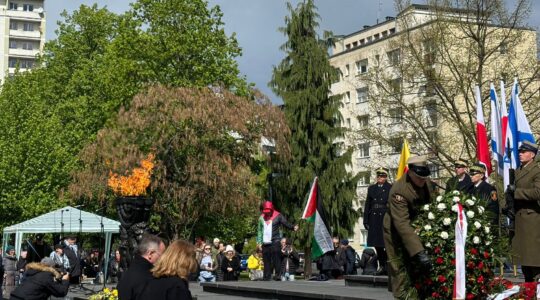TEL AVIV (JTA) – Yassin Musa, a refugee from Darfur, removes his Israeli identity card from his worn leather wallet and holds it like a prize.
Musa is one of more than 600 Sudanese refugees from Darfur who have been granted temporary residency in Israel. He and his fellow Sudanese fled the genocide in Sudan and passed through Egypt on their way to the Jewish state.
Their new status here constitutes a major victory for the small Darfuri community in Israel and the non-governmental organizations that have been lobbying for them.
“I’ve now started to feel both Israeli and Darfuri,” said Musa, 30, who fled Darfur five years ago after his village was attacked by the Janjaweed, Arab militiamen who have killed an estimated 200,000 people in Darfur over the last few years.
During the attack, Musa fled to nearby mountains but was tracked down by the fighters. He was arrested, beaten and eventually released, but the Janjaweed shot his father, brother and a cousin to death.
The Darfuris’ path to receiving Israeli temporary residency status – the first were granted last month – has not been easy. Most refugees first spent months in prison for entering Israeli illegally and then were released under house arrest to work mostly on kibbutzim, in small towns or at hotels in the Israeli resort city of Eilat.
Now they are newly free and are official residents of the Jewish state, thanks in large part to intense lobbying by NGOs, Knesset members, figures like Elie Wiesel and even Aliza Olmert, the prime minister’s wife.
The Darfuris already have launched a networking and social welfare organization to help each other find work and places to live. They have also established a soccer league and even started a music group.
Musa, who was an architect in Darfur and hopes to continue in his profession in Israel, is the head of the new group, called the Sons of Darfur.
For now, the group is based in the one-room library of Hotline for Migrant Workers, one of the NGOs most instrumental in assisting them, a group that is funded by the New Israel Fund and others. The Sons of Darfur hope soon to find their own space where they can hold workshops, computer classes and meetings. For that, Musa says, they need to raise funds.
The Darfuris in Israel are mostly men, though there are women and children among them. Some are educated, having studied and worked in Sudan’s capital, Khartoum, and speak decent English. Others are uneducated farmers from small villages who were never far from home until they were chased out by the Janjaweed.
More than 50 of the refugees already are enrolled in ulpan Hebrew language classes in Tel Aviv, and the children are in Israeli schools in different parts of the country.
Though many Darfuris come to Tel Aviv, the government is considering sending them and migrants from other African countries to the country’s more rural North and South, where the government says there are more jobs suited to them. Many African immigrants already work in the hotel industry in Israel’s southernmost city, Eilat.
In Tel Aviv, the Darfuris help each other out, offering to share small apartments with newcomers until they find work and can pay their own rent . They often work nights, in restaurant kitchens or as cleaners. They share work leads and on the weekends gather to play traditional Darfuri music.
Musa has received a scholarship at a local college to study an architecture software program that is the basis for most architectural work in Israel. He says his goal is to return to Darfur one day and rebuild the villages destroyed by the Janjaweed.
But he says he wants to do it in a “smart” way: to use better materials and more modern structures that would withstand possible future attacks and generally be more functional.
At his apartment at night, Musa sketches drawings of these homes and buildings.
“All the time I am thinking about rebuilding Darfur,” Musa told JTA. “Villages there still look as they did hundreds of years ago. I think when there is peace we need to sit together and think about how to rebuild the region.”
Musa says he and other refugees here are also thinking about ways to bring Israeli refugee relief to Darfur – both to deliver aid to home and to boost Israel’s reputation in Sudan, a Muslim country. He says he’s discussed the subject with Aliza Olmert, who has become an advocate on behalf of the refugees.
Like many Darfur refugees, Musa describes the difficult conditions and treatment in Egypt, where the refugees spent time before reaching Israel.
Once in Israel, he said, the refugees, though they were housed in a prison, were kept together in relatively good conditions in sections of the prison normally reserved for foreign workers awaiting deportation.
Musa said he has been moved by the response of the Israeli public to the plight of the Darfuris.
“Here there are really amazing people,” he said. “If I wasn’t seeing it with my own eyes it would be difficult to believe it.”





